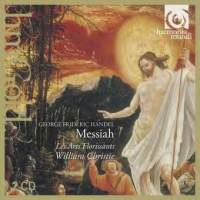Texte paru dans: / Appeared in: |
|
|
Reviewer: John
Bauman Just a couple of years after Harmonia Mundi issued the fascinating recording of Messiah led by Nicolas McGegan (Harmonia Mundi HMU 907050/52), they provide us with another version. The McGegan included all known variants of the score and allowed the listener to program his choice of alternatives. Now William Christie provides us with the original Dublin score. This can be valuable for collectors who don't want to (or can't) program the Dublin version into their CD players, but I can't recommend it to someone who wants only one recording of Messiah, for I think that a later version, particularly the Foundling Hospital version, is ultimately more satisfying. For those who want the Dublin version, this is in direct competition with that by Marriner (Philips 434 695, Fanfare 16:5) and the Scholars Baroque Ensemble (Naxos 8.550667/8, Fanfare 16:4). Christie's five soloists are all quite good. The four upper voices are all above reproach. I do have some reservations about the bass, Nathan Berg, whose voice is more of a baritone. As such, he lacks the darkness and power I feel are needed in “The people who walked in darkness“ and “Why do the nations.“ He also produces rather unpleasant sounds when pronouncing “shake“ in “Thus saith the Lord.“ Otherwise he sings very well. Barbara Schlick has a clear, focused voice that never grates while Sandrine Piau has an especially sensuous voice of pure velvet. The countertenor, Andreas Scholl, has one of the fullest voices I have heard from any countertenor. In “Oh Death, where is thy sting?“ he blends especially well with Nathan Berg. Mark Padmore's tenor has a ringing quality that is perfectly suited to this music. Though we are dealing with soloists of various nationalities, English pronunciation doesn't seem to be a problem. The chorus and orchestra are very polished and the recorded sound is exemplary. The notes are brief. Texts and translations are provided. As I noted, I wouldn't want the Dublin version as my only recording of Messiah. If you want one as a supplement, you could do much worse than this one, e.g., Marriner. For practical (financial) reasons, you might want to consider the bargain basement edition on Naxos. | |
|
|
|
|
|
|
|
Cliquez l'un ou l'autre
bouton pour découvrir bien d'autres critiques de CD |
|




